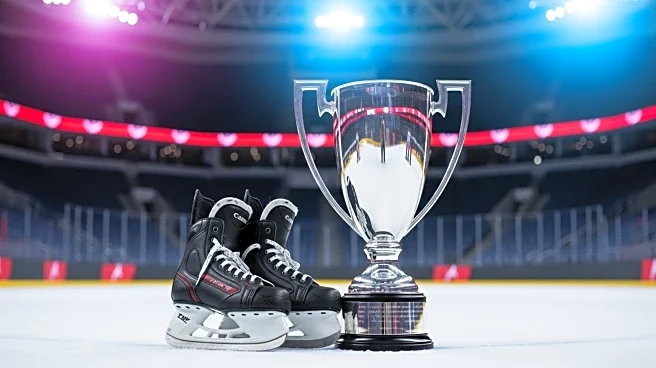What's Happening?
The Washington Capitals are projected to have strong fantasy rankings for the 2025-26 NHL season, according to NHL.com's 32 in 32 series. Alex Ovechkin, who recently broke Wayne Gretzky's all-time NHL goals record, is highlighted as a top player. Despite playing only 65 games last season, Ovechkin ranked among the League leaders in several categories, including goals, goals per game, power-play goals, and shots on goal per game. His record-setting season was marked by his highest shooting percentage and lowest average ice time per game. Ovechkin remains a fringe top-20 overall player in fantasy due to his high shot volume and power-play capabilities.
Why It's Important?
The projections for the Washington Capitals players, particularly Alex Ovechkin, are significant for fantasy hockey enthusiasts and stakeholders. Ovechkin's consistent performance and ability to break records make him a valuable asset in fantasy leagues. His high ranking in various statistical categories suggests that he will continue to be a key player for the Capitals and a top choice for fantasy team managers. This impacts the strategies of those participating in fantasy hockey, as they may prioritize acquiring Capitals players, especially Ovechkin, in their drafts.
What's Next?
As the 2025-26 NHL season approaches, fantasy hockey managers will be closely monitoring the performance of Washington Capitals players, particularly Alex Ovechkin. His ability to maintain high performance levels despite changes in ice time and shooting percentage will be crucial. Fantasy managers may adjust their strategies based on preseason games and player health updates. The Capitals' overall team dynamics and any roster changes could also influence fantasy rankings and projections.
Beyond the Headlines
Ovechkin's achievement in breaking Wayne Gretzky's record not only cements his legacy in the NHL but also highlights the evolving nature of the sport, where players are increasingly breaking long-standing records. This could inspire younger players and shift the focus of teams towards nurturing talent capable of achieving similar feats. The cultural impact of such milestones can enhance the popularity of hockey and influence the next generation of players.












